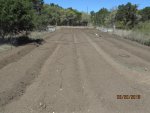Here's the other side of the story. I never use a soil test kit. They work, or not, but I consider them a waste of time, too, because it's a snapshot and I'm a long-term player. pH is either pretty close to neutral or normal gardening is impossible. You add N,P & K to about the same extent that you grow vegetation each year and add as much mulch as vegetation grown & removed each year and you stay in approximate balance. (I send all garden plant remains to recycle to eliminate over-wintering of pests & diseases).
Every year I do about the same things, all intended to maintain if not build better soil. My garden always has a complete cover of mower-chopped leaves as a mulch. In summertime I spread collected grass clippings on top of that, except when the grass has had Weed & Feed applied within 3 weeks. I only turn with a shovel as big an area or hole where I am planting something in spring. Once in a while in autumn I will turn a plot of soil with the shovel, but only if I feel like it. Occasionally, I intern a rabbit or squirrel that has drowned in the canal, or a batch of fish guts. Earth compacts only if you walk on it or the rain packs it down. Since I always have a good cover of mulch and add ~6 to ~9" of leaves and clippings every year, the soil is highly organic and concurrently open and friable. I broadcast 20-20-20 every autumn which dissolves into the mulch over winter and so, is readily available the following spring. I use
Jersey Green Sand and
Mennefee Humate in my potting soil so I have in the past applied both to the garden to guarantee all micro-elements will be present. That only has to be done once in a blue moon. I also dig in a cup of
Bone Char in each planting hole. All the amendments can be had at any farm supply. I do the other things every year, so whatever the analysis is, it is high in everything, has great tilth, retains moisture, prevents most weed seeds from finding a home and/or makes pulling the occasional weed easy, and grows everything I want easily.
I never walk on the planting part: I have 24" square cement pads on each side of 30" wide beds about 12 feet long. I have four planting plots and I rotate crops religiously. The layout is permanent and makes life a lot easier than turning a whole garden every spring and tramping around on otherwise fine soil and mud. The amount of space between plants and rows doesn't really vary that much from year to year, and I don't grow more than my wife and I want to eat so I don't have more plants than I need. I have one indeterminate tomato, 2 cukes, one 8 foot row of Snap Peas, a dozen leaf lettuce in-between, wherever, one giant pumpkin that overruns an adjacent gravel area for two grandchildren, and a separate asparagus plot and a bonsai growing-on plot.
It's not really necessary to get all the numbers just right. After all, home gardening has been around for a lot longer than the science end of it has. Good general practices on a continuing basis will yield a pretty good crop on a continuing basis. Composting is a lot like work. Nothing is as nice as well composted compost and I steal some whenever I can, but I've been there, and I'm lazy.


